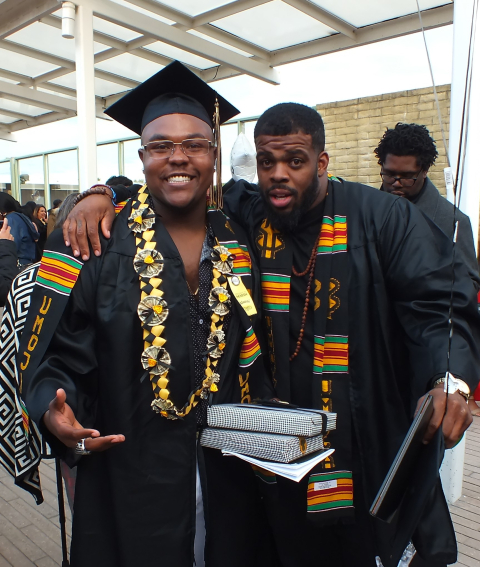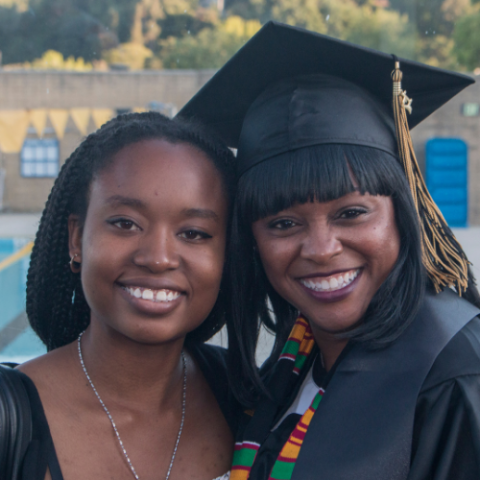This is Part II of our first story in our year-long series on College of Marin’s (COM) Umoja program. You can find Part I of this story here.
Join us every other week in 2021 to explore how COM’s Umoja program empowers students, promotes unity, and builds community and equity.
Part II
Sense of Belonging
One of the core programs COM Umoja offers is a learning cohort of students who go through an English and a counseling class together. Because students stay together while studying the same materials and being in the same classrooms, it builds their social interactions and develops a strong sense of place.
Alum d’Artagnan Connor III was a part of COM Umoja’s very first learning cohort in 2015 where he discovered English was something relevant for him.
“The Umoja cohort had two parts,” Connor recalls. “Tonya Hersch’s English class led into Troy Stevenson’s counseling class, giving us information on how the college system really works. For the first time, college got interesting to me, because we weren’t just doing regular English. We’re reading about different African American innovators, professionals, and highlighting different stories. She did a great job of working it into sentence structure. I was actually enjoying her class. And because I was in the cohort, Troy was always our guaranteed counselor where I got to establish that relationship from the beginning.”
Professor Troy Stevenson says the Umoja faculty would often see where d’Artagnan was as a way to check in on how well the program was running. “When we saw d’Artagnan succeed, we knew Umoja was succeeding.”
From the beginning, COM Umoja has been offering on-campus jobs to four Student Assistants each year. The position serves to be a peer-mentor to other students, help with different tasks of running Umoja, and be the students’ voice during administrative meetings.

One of their very first Student Assistants, Nequeshé Dyer, who is now an Administrative Assistant in COM’s Student Services office, started one of their most successful services, Umoja’s Tuesday and Thursday Breakfasts.
Early on, Dyer asked, “what can we do for folks that is going to impact them? I thought, it’s hard to focus on learning when you’re hungry. This is something we can do. It’s not going to be a big hit to the budget, even if it’s just $8, I’ll make it work. It was successful, and people really appreciated it.”
For the first few years, Dyer was also the face of COM’s Umoja program, as she sat at the Umoja Village’s front desk, greeting people, inviting them in for a snack, asking if there was anything they needed, and most importantly, making all who entered the space feel welcomed and appreciated.
“My first impression of Umoja was warmth and acceptance,” remembers former Umoja Student Assistant, Malaika Smith. “I walked in and the first person that always greeted me was Nequeshé. Everyone who came in was greeted by her with open arms. She was basically the first impression for me of Umoja which was a great impression.”
Many Umoja students make these same comments. Walter Turner acknowledges, “We could not have made it this far without Nequeshé. If it wasn’t for Nequeshé, you wouldn’t see the Umoja that you see today.”
Dyer recognizes that even though she’s currently in a different position at the college, she recognizes she is still contributing to the community. Often in education and elsewhere, there are too few people of color in influential positions to serve as role models. “I’m there so when we have Umoja students come in, we have someone who looks like them in some sort of a position for them to see as a faculty member or a long-standing staff member.”
COM Umoja has created a program that offers their students vital services that are tailored to help them succeed, with the learning cohorts, a high school outreach program, and tutoring services, to name just a few. The program also offers additional resources that help enrich the experience for students with their engaging speaker series, such as Dr. Angela Davis, Ericka Huggins, and Dr. Kevin Cokley.
The faculty and staff give in-depth webinars and workshops on issues around self-advocacy, equity in mental health, activism, financial management, single-parent parenting, and more. Statewide Umoja also has conferences and symposiums yearly that COM Umoja students are encouraged to attend and greatly enjoy.

When Umoja began, it was founded on the belief of self-efficacy, that when a faculty or staff member was willing to be open with students in telling their stories and experiences, it humanized the classroom for the student. It came from an ethic of love and made college more relatable and education more personal which in turn empowered students in their pursuit of a degree.
Higher education is difficult. Not everyone is given the support system earlier in their education to know how to navigate college. Umoja also provides wrap-around services such as help with transportation, food assistance, and helping with other basic needs that might prevent students from attending college. These approaches to nurturing students have increased student retention and transfer rates statewide.
“We have these absolutely wonderful people attached to us who just make everything so much smoother,” says D’Vonne Rosas a current Umoja Student Assistant. “It’s meant for that. It’s meant especially for students who don’t understand how college life works, because I sure didn’t. When I first started at COM, there was that uncertainty, that anxiety, and that fear. That’s what Umoja is there for. It’s the beacon of light, if you will. It’s been my beacon of light.”
Stay tuned for student and faculty spotlight stories, program highlights, and more in-depth stories into COM Umoja, including the newly launched Umoja Equity Institute to bring the principles of Umoja to the larger campus and community with the goal of increasing racial equity.
Discover how College of Marin Umoja Community can help you succeed at marin.edu/umoja.
To support the COM Umoja program, please donate. All donations go directly to the program and student scholarships and are tax-deductible.
